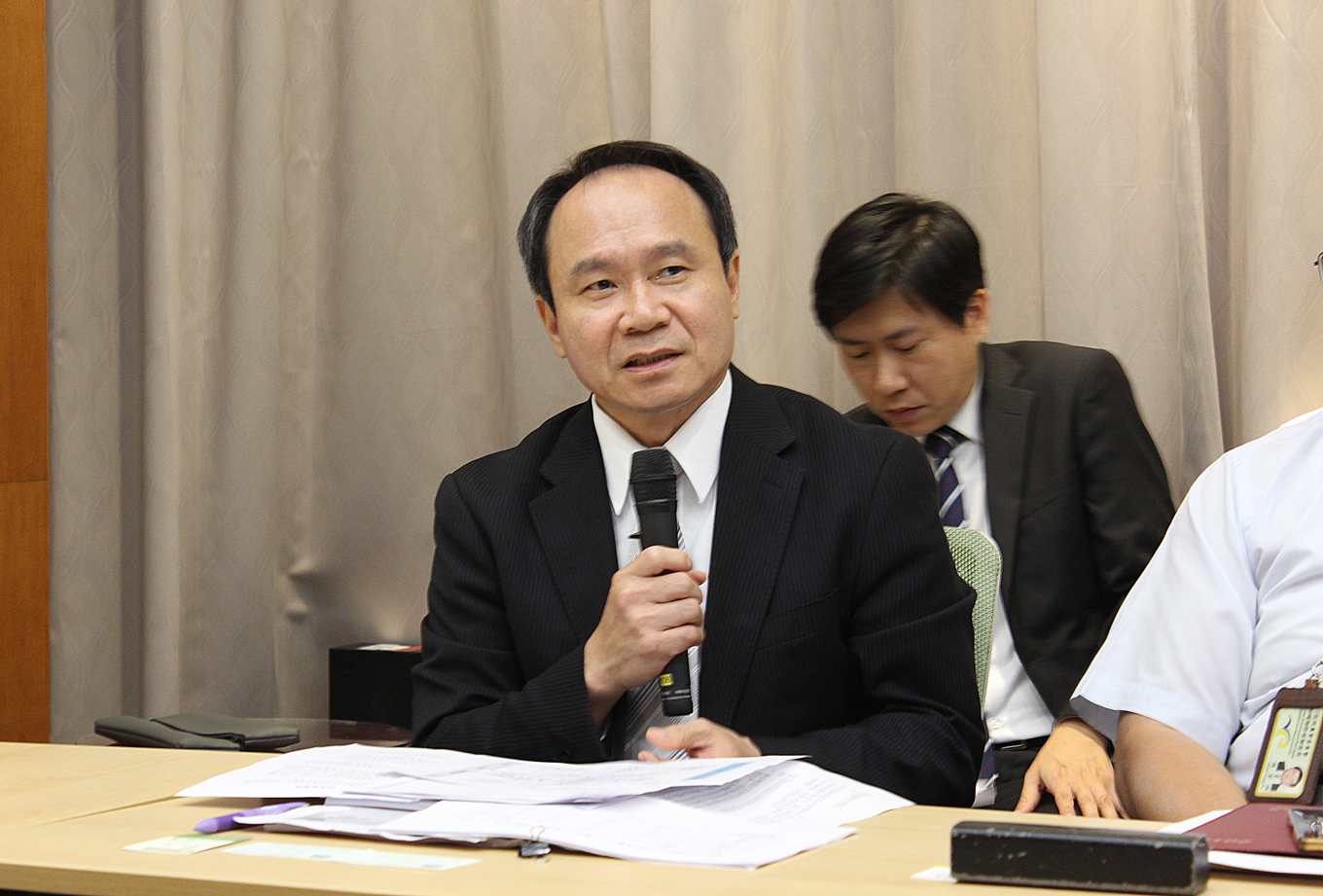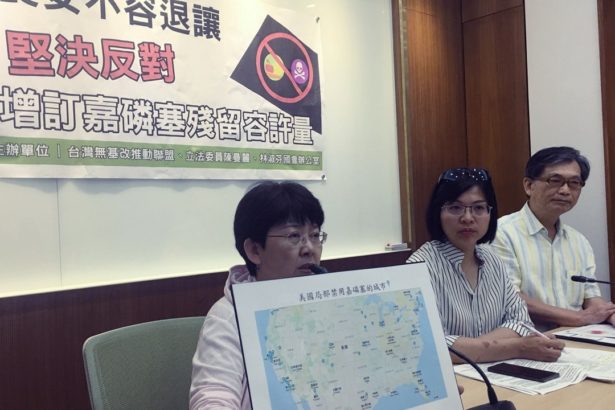The group called for the cancellation of the notice of relaxation of the allowance of imported miscellaneous grains. Lin Shufen questioned, for whom is the retrogression?
Share
The herbicide Carathion has caused cancer controversy in the world, and even lost three consecutive lawsuits to award sky-high prices. However, the Food and Drug Administration of the Ministry of Health and Welfare of China (hereinafter referred to as "Food and Drug Administration") announced in advance on April 23 to increase and relax the residual allowance for a number of imported miscellaneous grains, causing doubts and opposition.
The Taiwan Alliance for the Promotion of non-basic Reform held a press conference today (15), asking the Food and Drug Administration to rescind the amendment notice for the addition of the residual standard of Carathion Competition, and to make public the information of the evaluation to explain the basis for relaxing the standard. Legislator Lin Shu-fen said that at present, the Food and Drug Administration inspects imported miscellaneous grains according to the "before relaxation" standard, and the qualified rate is as high as 90% as of March this year (2019). She does not understand why it is necessary to retrogression the standard and relax the residue standard.
In this regard, Lin Chin-fu, Deputy Director of the Food and Drug Administration, responded that as long as there is an application from a manufacturer, the Food and Drug Administration will conduct an examination in accordance with the SOP. In response to the different views and doubts expressed by various parties at the press meeting, he said that the Food and Drug Administration would conduct further research and analysis before making a final decision.


Photo by Duan Yaxin at the press conference
Food and Drug Administration: manufacturers evaluate according to SOP after application
In response to the above queries, Lin Chin-fu, Deputy Director of the Food and Drug Administration, responded that as long as the manufacturer submitted an application, the FDA would follow the SOP process. At the end of the current scrutiny stage, it will enter a period of public comments and listen to the pros and cons of all parties within 60 days of the announcement of the notice.
Lin said that further research and analysis will be done on the scientific research paper report put forward by Guo Huaren. As for the debate in the international community and the heated debate between the two sides, can China conduct its own experiments to do the most appropriate research on the eating habits and health of the Chinese people? Lin said that pesticide reviews at home and abroad are based on the formulation of norms and required documents, and are reviewed in accordance with the process. If manufacturers want to do testing on their own, then it is through an impartial third party to test. However, in the case of the current addition of cases in the Caroline Competition, it is still based on international data as the basis for evaluation.
Is the Monsanto assessment information public? FDA: confidentiality considerations, inconvenient for disclosure
Liao Jiading, head of the Food Safety Assessment Section of the Food and Drug Administration, aims at which documents the applicant manufacturers need to submit for further explanation. He said that manufacturers would be required to provide information on physical and chemical properties, safety assessment data, animal toxicity test data, field residue regression time data, and local dietary habits to compare exposure risks.
With regard to whether Monsanto, which submitted this application and is highly controversial, can disclose the contents of its submission documents for the public and experts from all sides to examine whether there is any risk, Lin said that all the information that Monsanto should provide has been provided, but it is not convenient to make it fully public at present due to the consideration of the confidentiality of the applicants.
Agricultural testing Institute: still under the risk of safety exposure after assessment
Cai Yuren, head of the toxicology group of the Agricultural Drug Test Institute of the Council of Agriculture, which mainly carries out pesticide evaluation, said that the data adopted in this assessment are mainly relevant international evaluation institutions and international journals, and the reports submitted by the evaluation institutions must comply with the good laboratory practice (Good Laboratory Practice, referred to as GLP) before they are included in the main evaluation items, but if they are not GLP reports, they are still valuable for discussion. Will still participate in the discussion of the evaluation.
Cai explained that pesticide assessment will be considered from three aspects: hazard identification, epidemiology and exposure risk. In the part of hazard identification, it will be estimated to be the closest to humans from different animal tests.
However, in the part of epidemiology, he admitted that because there are so many factors of variation, "some (experiments) have done some (some have caused harm to the human body), and some have not done it." he believes that more researchers' data are needed to be able to directly prove that many hazards are related to Carathion, and he believes that this part is indeed lacking at present. As for exposure risk, it has increased from 7.9%ADI to 12.6% this time, and he believes that after the increase, it is still under the risk of safe exposure.
In response to the claim that the evaluation units were biased towards the European Food Safety Agency (EFSA) and the National Environmental Protection Agency (EPA) of the United States, Cai responded that they also referred to the data of the International Agency for Research on Cancer (IARC), but he also pointed out that the Joint meeting of Pesticide residues experts (JMPR), also under the World Health Organization (WHO), held the opposite view with the International Agency for Cancer Research (IARC) on the issue of the Garnet.
He said that any relevant international information and documents have been taken into account in the evaluation. However, he also said that it is necessary for the government to continue to pay attention to the reports related to Garnet.
Taiwan plans to greatly relax the residue of herbicide Jiaposi! Imported wheat, oats and other 10 items of miscellaneous grains, with a maximum of 10 ppm allowed
(for related news, please click here.)
How many more are there? "when the European Union opens the black box of pesticide review, Taiwan intends to relax the residue standards.
Is the pesticide audit agency just the mouthpiece of the pesticide factory? The European Parliament revealed that Germany's Gaposse censorship directly copied the Monsanto report.
After long-term spraying every spring, the amateur gardener also got lymphoma and mistakenly believed in Monsanto's advertisement: Jiaposai is safer than salt.
The cancer risk report of Jiaposai has been exposed! Monsanto has been under pressure for four years, and the black hole finally shows its dawn every spring.
Monsanto deliberately concealed the cancer risk of Garrette for 40 years. The court awarded NT $9 billion in the Johnson & Johnson case, and 4, 000 Americans waited to go to court.
Monsanto documents are exposed! Taiwan is also the object of courting │ to bribe experts to name it, whitewashing the cancer risk of Garnet.
Pesticide consumption in Taiwan has reached a 17-year high! The US court ordered Garrette to pay sky-high compensation and ban Taosong for the protection of babies. Will Taiwan follow suit?
Sales of herbicides in Taiwan hit a record high! The annual sales are 2.6 billion yuan, and the consumption per unit area is among the best in the world.
There is no excessive amount of ─ herbicide in Cuncao, which impacts the soil ecology and increases the risk of cancer.
- Prev

[20190515 Press release] Food an cannot afford to give way and firmly opposes the increase of the residual allowance of gabion plug.
[20190515 Press release] Food an cannot afford to give way and firmly opposes the increase of the residual allowance of gabion plug.
- Next

Yunlin County-promote the selection of nutritious lunch for local livestock and poultry products
Yunlin County is a major livestock and poultry production county. Yunlin raises 1.49 million pigs, nearly 6.8 million colored broilers, 2.02 million ducks and 300000 geese, all of which are the first in the country. The output value of livestock and poultry industry is as high as 30 billion, and the livestock slaughtering and processing plants in the county are also complete.
Related
- A course of planting techniques and methods on how to grow carrots
- How to plant the latest tulips?
- Is it better to pick tea in the morning or in the afternoon? When is the best time for tea to be picked? what is the third or fifth tea?
- Launch Yuanxiao Happy combination Haocha + Tea Yuan healthy Taste
- Penghu Tourism "Fireworks 20 Parade with You"
- 2022 West Lake Happiness holds "Digital Revitalization Voucher" and draws iphone13 and laptop.
- Banqiao Fuzhou social houses are designed to change start-up combined with police elimination to create a safe and livable environment
- The convenient measure of "mechanical weeding" in Xinbei has been abused and the Agriculture Bureau has imposed heavy penalties on the illegal land consolidation.
- Changgeng University Joins Hands with Four Memory Factories to Rescue Memory Talent Shortage
- The list of Taiwan's top 100 MVP managers is listed by the Director-General of the Farmers' Association of Sanxia District.

